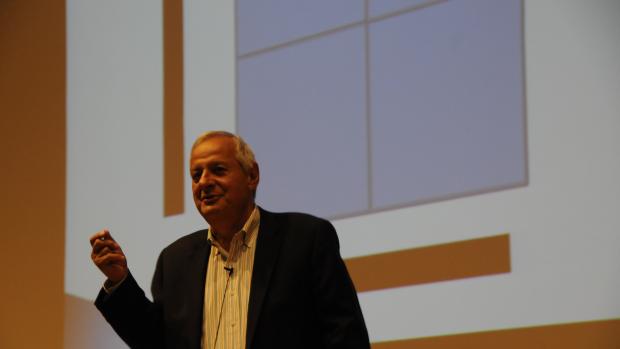Tips from the Top
Alumnus John Trani Addresses the Engineering and Technology Forum

There are many ways to describe John Trani: School of Engineering alum, successful businessman, generous Promise Scholarship supporter, operating partner of the evocatively named private-equity firm Stonepeak, protégé of the legendary Jack Welch, former president and CEO of GE Medical Systems, and one-time chairman and CEO of The Stanley Works, among them. The descriptor that could arguably go at the very top of that list is, however, straight shooter.
On September 22, Trani (POLY ’66, ’69, ’71, STERN ’78) returned to the School of Engineering to address Professor David Lefer’s Engineering and Technology Forum, which introduces new students to the core concepts of invention, innovation and entrepreneurship. (The Forum—a required course for all incoming freshmen—is widely acknowledged to be revolutionary, because undergrads elsewhere rarely have the opportunity to meet and engage with leading inventors, journalists, scientists, business executives and entrepreneurs.)
In the 1980s a straight-shooting Trani had famously rescued GE’s ailing Mobile Communication Division, which had lost some $40 million in the years before his appointment; under his leadership the division quickly generated $42 million and was ultimately sold for $274 million—a turn-around that Jack Welch called, at the time, the most impressive in GE history. Trani opened his Forum lecture by succinctly outlining the three-pronged attack that made such a feat possible: simplify the business, restore operating effectiveness, and become competitive.
The packed crowd in Pfizer Auditorium feverishly scribbled notes as Trani fired off a litany of other practical advice. Those lucky enough to be in the audience received a primer on running a business in the real world. The lessons that should be gleaned from his time at GE, he explained: organizations are resilient; sales and operations people matter, because making and selling the product matters; be visible; find people who can deliver, because while the brilliant idea is important, executing it is magnitudes more important.
Trani gave “tips from the top,” and his list ensured that the note-taking continued uninterrupted: differentiate yourself; be an achiever not a talker, measurements matter, so know the score; stretch your mind; learn from both failures and successes; be a team player; employ candor and constructive criticism wisely; don’t let money be your prime motivation, but don’t sell yourself short either.
Trani also gave the freshmen with a useful guide to making a good career choice. “If industry demand is high in your chosen field and you are very good at it, that’s obviously a path you should pursue. If industry demand is low and you’re a mediocre performer, stop right there and consider something else.” And what if you’re really good at something but industry demand happens to be low? “That’s when you get creative,” he asserted. “Maybe you should start your own business.”
His closing piece of advice: Win! “Winning is fun,” he said. “Who would ever want to lose?”




